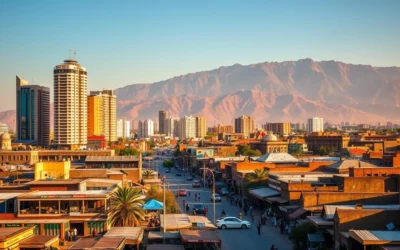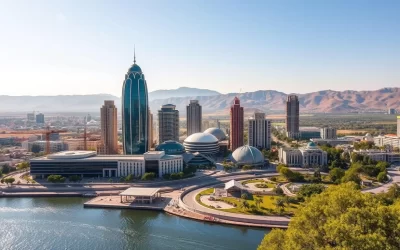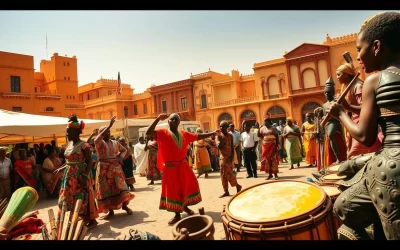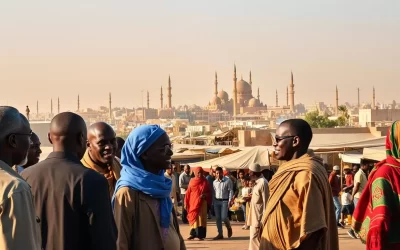Did you know that Sudan is one of the few places where African and Middle Eastern cultures seamlessly merge? This country offers a vibrant mix of traditions, landscapes, and experiences that are unlike anywhere else. From its bustling markets to its serene desert vistas, every corner tells a story.
When you travel here, you’ll find yourself navigating dusty streets filled with welcoming locals. Managing your currency wisely is key to making the most of your journey. Whether you’re exchanging money or tipping for services, preparation ensures a smooth experience.
Exploring this region is an adventure in itself. With its rich history and diverse culture, Sudan promises a trip that’s both memorable and enriching. Ready to dive into the details? Let’s get started.
Travel Overview: Discovering Sudan’s Unique Blend of Cultures and Landscapes
The heart of Sudan beats with a rhythm shaped by centuries of diverse influences. Here, Arab and African traditions intertwine, creating a cultural tapestry that’s both rich and unique. From the bustling streets of Khartoum to the serene villages along the Nile, every corner tells a story.
Understanding the Cultural Context
Sudan’s people are a testament to its cultural diversity. You’ll find a blend of Arab and African influences in everything from language to daily life. Traditional practices, like tea breaks in local villages, coexist with modern urban lifestyles. This intersection of old and new makes the country a fascinating place to explore.
When interacting with locals, you’ll notice their warm hospitality. It’s common to be invited for tea or a meal, so embracing these moments can enrich your experience. Dressing modestly and respecting local customs will help you connect more deeply with the culture.
Exploring Must-Visit Destinations
Your journey wouldn’t be complete without visiting iconic sites like the pyramids of Meroe or the ancient temples of Jebel Barkal. These landmarks offer a glimpse into Sudan’s storied past. For a more immersive experience, wander through local markets where artisans sell handmade crafts and spices.
Accommodation options range from comfortable hotels in cities to modest lodgings in rural areas. Whether you’re staying in a bustling town or a quiet village, you’ll find welcoming hosts ready to share their way of life.
Before you arrive, ensure your visa is in order. Navigating the bureaucratic process can be smoother with the right information. Once you’re here, let the country’s charm and diversity guide your adventure.
Essential Travel Information for Your Sudan Adventure
Planning a trip to this region requires careful preparation and awareness of essential details. From obtaining the right documents to navigating transportation, every step ensures a smoother journey.
First, securing a visa is a must. Ensure your passport is valid for at least six months beyond your departure date. Registration with local authorities within three days of arrival is also required. These steps might seem tedious, but they’re crucial for compliance.
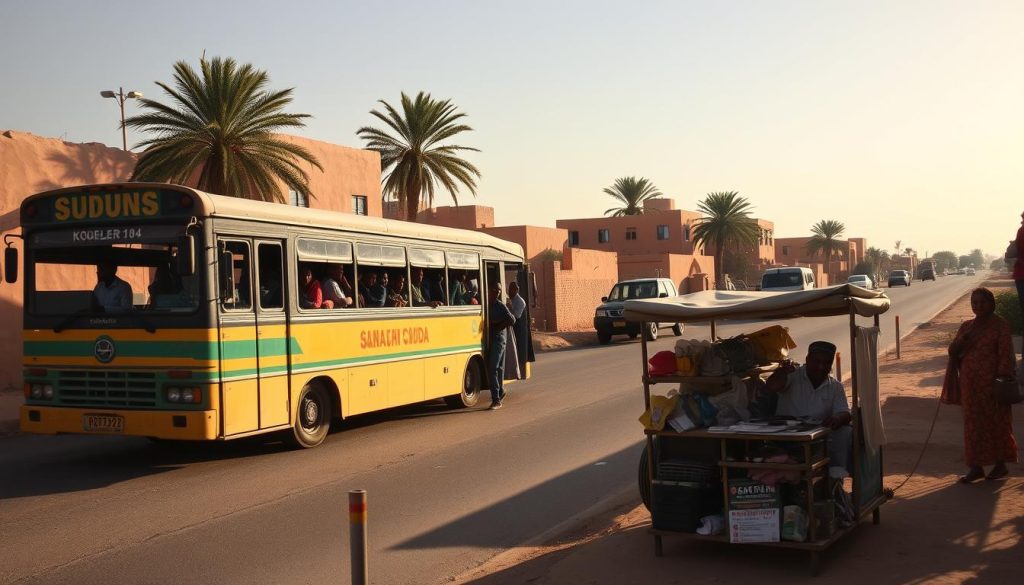
Traveling by bus is a common way to explore the area. Overland routes from Egypt or Ethiopia offer scenic views but come with challenges like rough roads and limited schedules. Minivans are another option, though they can be crowded. Weigh the pros and cons before choosing your mode of transport.
A typical day here might include visiting bustling markets, exploring ancient sites, or simply enjoying a cup of tea with locals. Embrace the slower pace and immerse yourself in the culture. Keep in mind that public transportation outside major cities is limited, so plan your routes in advance.
If you’re considering a trip to South Sudan, be aware of the regional complexities. Cross-border travel requires additional permits and careful planning. Stay informed about current conditions to ensure a safe and enjoyable experience.
Finally, staying organized and vigilant is key. Keep your documents secure, carry essentials like water and snacks, and be mindful of your surroundings. With the right preparation, your adventure here will be both memorable and rewarding.
Understanding Sudan’s Currency and Economic Landscape
The Sudanese pound has a rich history, shaped by decades of economic shifts. Its adoption reflects the country’s journey through political and economic changes. Today, managing your finances here requires understanding both official and unofficial systems.
History and Adoption of the Sudanese Pound
The Sudanese pound was introduced in 1956, replacing the Egyptian pound. Over time, it has faced challenges like inflation and devaluation. Despite these, it remains a symbol of national identity.
Recent economic reforms have aimed to stabilize the currency. However, fluctuating exchange rates and limited resources continue to impact its value. Understanding this history helps you navigate the financial landscape more effectively.
Local vs. Black Market Exchange Rates
Official banks offer one rate, while the black market often provides another. For example, 1 USD might fetch 500 pounds officially but 2,500 pounds on the black market. This gap highlights the economic complexities here.
In places like Wadi Halfa, border exchange practices reveal local economic dynamics. Traders and travelers often rely on unofficial channels for better rates. While this can be risky, it’s a reality many face.
Fluctuating water resources also play a role in economic stability. Scarcity affects agriculture and trade, influencing currency value. Similarly, transportation of goods and money reflects broader economic trends.
By understanding these factors, you can make informed decisions about exchanging and managing your money. Whether you’re in a bustling city or a quiet border town, being prepared ensures a smoother experience.
Banking Basics and Modern Payment Methods
Navigating the financial landscape in Sudan requires a blend of preparation and adaptability. Banking here operates differently than in many other places, with limited ATM access outside major cities like Khartoum. Knowing how to manage your money effectively is key to a smooth experience.
Local banks offer essential services, but their reach is often restricted. Digital payment methods are gaining traction, though they’re not yet widely accepted. Carrying cash in Sudanese pounds is crucial for smaller transactions, especially in rural areas.
Exchanging currency efficiently is vital. While official banks provide reliable rates, unofficial channels may offer better deals. Always prioritize safety and verify rates before making any exchanges.
When using public transportation, cash is the primary payment method. Buses and minivans rarely accept cards, so plan ahead and carry enough local currency. This ensures you can move around without hassle.
By understanding these basics, you’ll be better equipped to handle your finances during your travel Sudan adventure. Preparation and awareness go a long way in making your journey enjoyable and stress-free.
Navigating Payment Options: Credit, Debit, and Prepaid Travel Cards
Choosing the right payment method can make or break your travel experience. Whether you’re dining at a localrestaurantor exploring bustling markets, having the right tools ensures smooth transactions. Let’s dive into the pros and cons of credit, debit, and prepaid travel cards to help you make informed decisions.
### Pros and Cons of Using Travel Cards
Prepaid travel cards are a popular choice for many travelers. They allow you to lock in an exchangeratebefore yourtrip, protecting you from fluctuating currency values. However, they often come with loading fees and may not be accepted everywhere.
Credit cards, on the other hand, offer rewards like cashback or airline miles. They’re widely accepted, but foreign transaction fees can add up. Debit cards are a middle ground, with fewer fees but limited spending flexibility.
| Payment Method | Pros | Cons |
|---|---|---|
| Prepaid Travel Cards | Locked exchange rates, budget control | Loading fees, limited acceptance |
| Credit Cards | Rewards, wide acceptance | Foreign transaction fees |
| Debit Cards | Fewer fees, direct access to funds | Limited spending flexibility |
When dining out or shopping locally, prepaid cards can help you stick to your budget. For larger expenses, credit cards might offer better protection and rewards.
“Using a prepaid card saved me from unexpected fees during my last trip. It’s a great way to manage expenses without overspending.”
Carrying some cash is still essential, especially in rural areas where card acceptance is limited. By balancing card payments and cash, you’ll navigate yourtripwith ease and confidence.
Local Money Exchange Practices and Safety Tips
Exchanging money in local markets requires both knowledge and caution. While official banks offer stability, local exchange centers often provide better rates. Understanding the nuances of these options can save you time and money during your travels.
When visiting a market, negotiation is key. Exchange rates can vary, so it’s wise to compare offers before committing. Start by asking around to get a sense of the fair rate. This approach ensures you’re not overpaying and helps you secure the best deal.
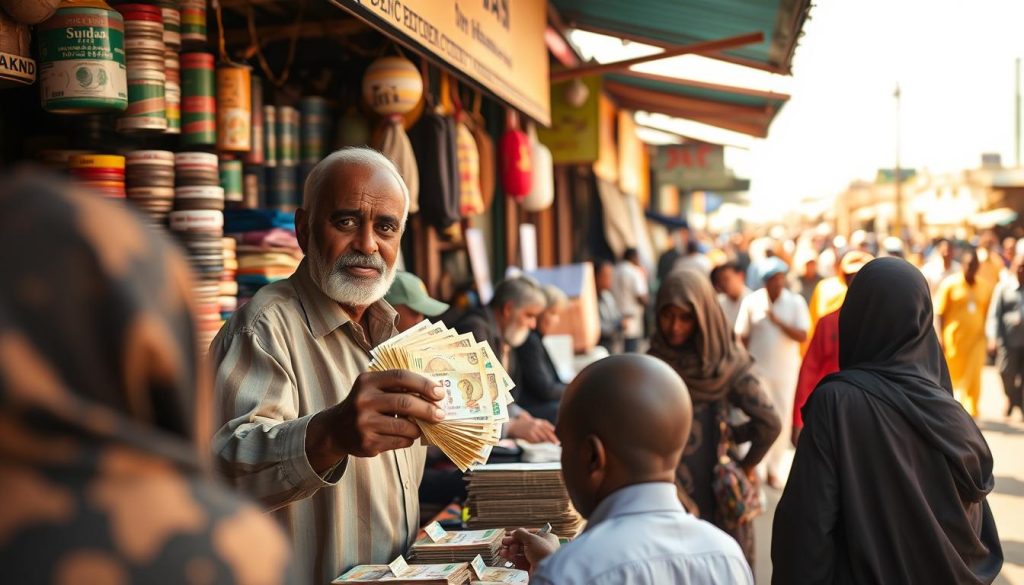
Safety is a crucial part of the process. Avoid exchanging money on busy streets or in isolated areas. Instead, opt for reputable exchange centers or trusted locals. Always count your money carefully and keep it secure to prevent theft or scams.
Being well-informed protects you from fraud. Research current exchange rates before your trip and carry a small calculator to verify amounts. This preparation ensures you’re not taken advantage of during transactions.
“Always trust your instincts. If a deal seems too good to be true, it probably is.”
Finally, remember that food and other daily expenses often require cash. Plan your exchanges accordingly to avoid running out of local currency. By following these tips, you’ll navigate local money exchange practices with confidence and ease.
Transportation, Money Management, and Daily Budgeting in Sudan
Exploring the transportation and budgeting options in this region can make your journey smoother and more enjoyable. Whether you’re hopping on a bus or staying in local accommodation, planning ahead ensures you stay within your budget while experiencing the best this area has to offer.
Bus and Minivan Travel Costs
Traveling by bus or minivan is a common and affordable way to get around. For example, a bus ride between major cities typically costs around $10-$15. Minivans are slightly cheaper but can be crowded. Private jeeps offer more comfort but come at a higher price, often ranging from $50-$100 per trip.
At the bus station, it’s wise to carry small bills for tickets. Negotiating fares is common, so don’t hesitate to ask for a better deal. Always confirm the departure time, as schedules can be unpredictable.
Budgeting Tips for Daily Expenses
Managing your daily expenses starts with understanding the costs. A meal at a local restaurant usually costs $3-$5, while bottled water is around $0.50. Staying in budget-friendly accommodation can save you money, with prices ranging from $10-$30 per night.
Tourist-favored hotels are more expensive, often charging $50-$100 per night. If you’re looking to save, consider local guesthouses or hostels. They offer a more authentic experience and are easier on your wallet.
When exchanging money, visit a reputable bank or exchange bureau in large cities. Avoid street vendors to minimize the risk of scams. Keep your cash secure and divide it between different pockets or bags for safety.
By planning your transportation and daily expenses wisely, you can explore this part of the world without breaking the bank. A little preparation goes a long way in ensuring a comfortable and memorable trip.
Staying Connected: SIM Cards and Mobile Payment Options
Staying connected while traveling is essential for both convenience and safety. Whether you’re navigating a new area or communicating in emergencies, having reliable mobile services ensures a smoother experience. Let’s explore how to stay connected and manage your mobile needs effectively.
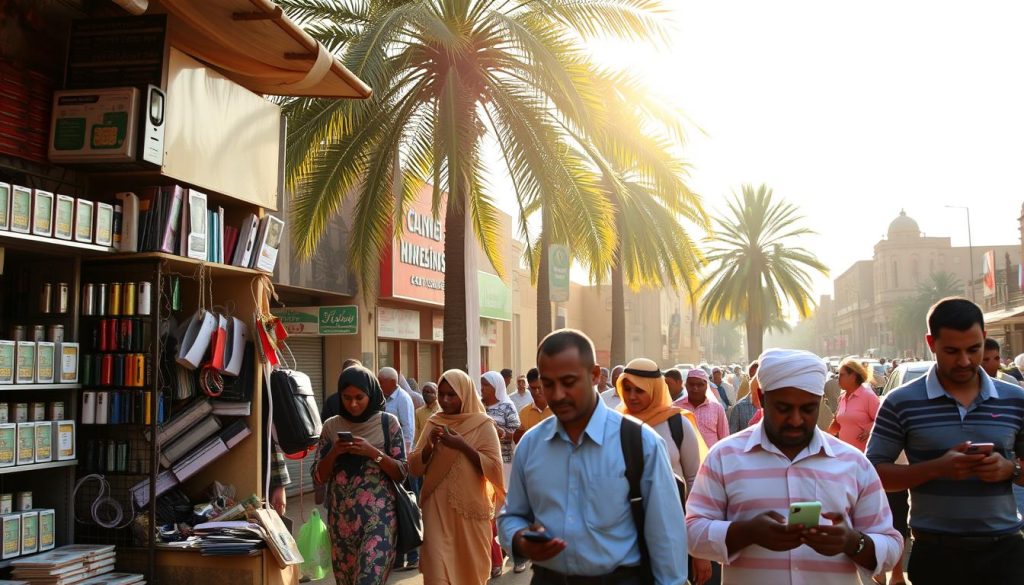
Purchasing a local SIM card is straightforward but requires your passport for registration. Providers like MTN and Sudani offer affordable options, with packages starting as low as $4 for 3 GB of data. This process is quick and ensures you’re connected as soon as you arrive.
Connectivity can vary depending on your location. In urban areas, you’ll find strong signals, but rural regions and border towns like Wadi Halfa may have limited coverage. If you’re traveling to remote areas, consider eSIM options like Holafly, which provide immediate access without the need for a physical SIM card.
| Provider | Data Package | Price |
|---|---|---|
| MTN Sudan | 3 GB | $4.35 |
| Sudani | 3 GB | $4 |
| Holafly | 5 GB | $47.90 |
Mobile payment options are gaining popularity, especially for cross-border transactions. Services like MTN Mobile Money allow you to transfer funds securely and pay for goods without carrying cash. This is particularly useful in areas where ATMs are scarce.
“Using an eSIM saved me from the hassle of swapping SIM cards. It’s perfect for travelers who value simplicity.”
Staying connected also ensures you can handle money transfers and emergency communication with ease. Whether you choose a local SIM or an eSIM, having access to mobile services is a game-changer for your trip. Plan ahead, compare prices, and choose the option that best fits your needs.
Security Measures for Handling Your Money Abroad
Keeping your money safe while traveling is as important as planning your itinerary. Whether you’re exploring a bustling city or visiting iconic sites like the pyramid, taking precautions ensures a smooth and stress-free experience.
Protecting Yourself Against Scams
Scams can happen anywhere, but being aware of common tactics helps you stay one step ahead. For example, fake ATMs or overcharging at markets are frequent issues. Always use ATMs located inside banks or reputable establishments to minimize risks.
When exchanging money, avoid street vendors. Stick to trusted exchange centers or banks. If a deal seems too good to be true, it probably is. Trust your instincts and walk away if something feels off.
Practical Tips for Safeguarding Your Money
Here are some actionable steps to keep your finances secure:
- Use hotel safes to store extra cash and valuables when leaving your room.
- Carry only the amount of cash you need for the day.
- Divide your money between different pockets or bags to reduce the impact of theft.
- Stay vigilant in crowded areas, especially at tourist hotspots.
| Scenario | Safety Measure |
|---|---|
| Using ATMs | Choose machines inside banks or secure locations. |
| Exchanging Money | Use trusted exchange centers or banks. |
| Exploring Tourist Sites | Keep valuables hidden and stay aware of your surroundings. |
“Always trust your instincts. If something feels wrong, it’s better to be safe than sorry.”
By following these tips, you can enjoy your travels without worrying about your finances.
Insider Tips on Exchanging Money and Finding Value
Getting the best value when exchanging money requires insider knowledge and a bit of strategy. Whether you’re from the United States or the United Kingdom, understanding local practices can save you time and money.
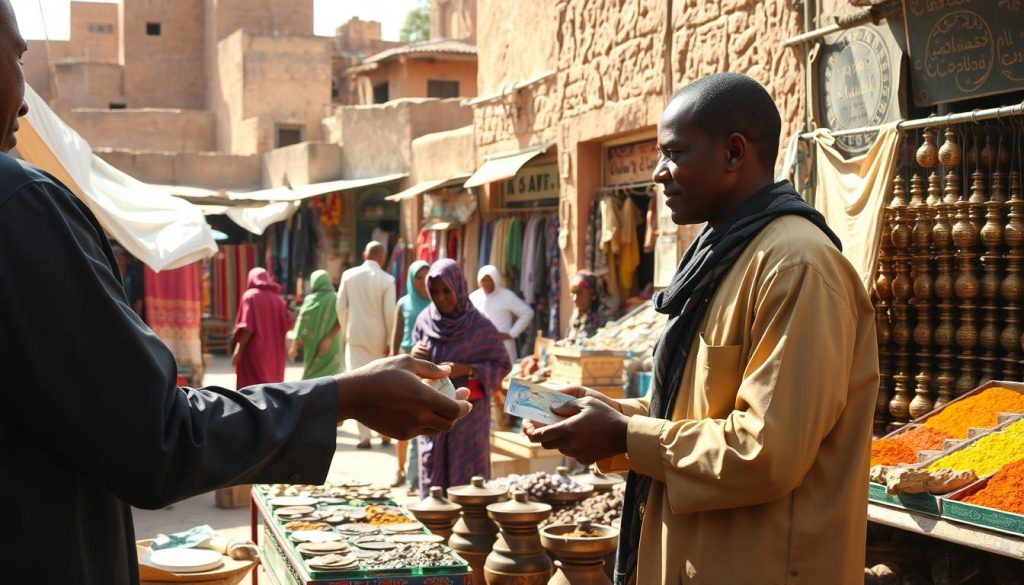
Start by seeking recommendations from fellow travelers. Many visitors from the United States and United Kingdom share valuable insights on where to find the best rates. Local advice can often lead you to hidden gems that official exchange centers might not offer.
Negotiation is key in many places. Don’t hesitate to ask for a better rate, especially in smaller exchange centers. This approach can lead to significant savings, especially if you’re exchanging larger amounts.
However, be cautious of potential crime. Avoid exchanging money in isolated areas or with street vendors. Stick to reputable exchange centers or banks to minimize risks. Always count your money carefully and keep it secure.
“I always ask locals for their favorite exchange spots. It’s a great way to get insider tips and avoid scams.”
Finally, timing matters. Exchange rates can fluctuate throughout the day, so monitor trends if possible. By combining local knowledge, negotiation skills, and caution, you’ll maximize your money and enjoy a smoother travel experience.
Sudan: Ultimate Travelers Guide to Currencies & Payments
Managing your finances effectively is crucial for a seamless travel experience in this region. Understanding the nuances of currency exchange and payment methods can save you time and money. Let’s recap the key points and provide actionable tips for handling your money wisely.
One of the most significant challenges is navigating the differences between official and unofficial exchange rates. In Port Sudan, for example, the black market often offers better rates than banks. However, using unofficial channels comes with risks, so always prioritize safety.
| Currency | Official Rate (USD) | Black Market Rate (USD) |
|---|---|---|
| 1 USD | 500 SDG | 2,500 SDG |
| 1 EUR | 550 SDG | 2,700 SDG |
For secure transactions, consider using reputable financial services. Prepaid travel cards are a great option, as they allow you to lock in exchange rates and avoid foreign transaction fees. Always carry some cash for smaller purchases, especially in rural areas.
“Using a prepaid card saved me from unexpected fees during my last trip. It’s a great way to manage expenses without overspending.”
When exchanging money, stick to trusted banks or exchange centers. Avoid street vendors to minimize the risk of scams. Keep your cash secure by dividing it between different pockets or bags.
By following these tips, you’ll navigate the financial landscape with confidence. Whether you’re exploring bustling markets or visiting iconic sites, being prepared ensures a smooth and enjoyable journey.
Additional Resources and Tools for Financial Planning in Sudan
Effective financial planning can make your trip smoother and more enjoyable. With the right tools, you can track exchange rates, manage your budget, and ensure your money is safe. Here’s a guide to some of the best resources available.
Useful Websites and Currency Tools
Staying updated on exchange rates is crucial. Websites like XE and OANDA offer live currency comparisons, helping you make informed decisions. These tools are especially useful in the capital, where exchange rates can vary widely.
For travel insurance, consider platforms like World Nomads or SafetyWing. They provide coverage tailored to your needs, ensuring you’re protected against unexpected events, including violence or theft.
Money Transfer and Budgeting Assistance
Services like Wise and Remitly are excellent for sending money internationally. They offer competitive rates and low fees, making them ideal for travelers. Budgeting apps like YNAB or Mint can help you track expenses and stick to your financial plan.
“Using a budgeting app saved me from overspending during my trip. It’s a must-have for any traveler.”
How to Use These Tools Effectively
Start by bookmarking these resources before your trip. Monitor exchange rates daily and transfer money when rates are favorable. Use budgeting apps to set daily spending limits and track your expenses in real time.
| Resource | Purpose | Example |
|---|---|---|
| XE | Currency Comparison | Track Sudanese pound rates |
| World Nomads | Travel Insurance | Coverage for theft or accidents |
| Wise | Money Transfer | Send funds with low fees |
By using these tools, you’ll have better control over your finances. Whether you’re in the capital or exploring remote areas, these resources ensure a stress-free experience. Bookmark them today and make them an essential part of your travel planning.
Conclusion
Every road you take in this region leads to new discoveries and unforgettable experiences. By managing your money wisely and staying vigilant, you can focus on the journey ahead. Use the tips and resources shared here to navigate confidently, whether you’re exploring bustling markets or remote villages.
Preparation is your best driver for a smooth trip. From exchanging currency safely to budgeting daily expenses, these insights ensure you’re ready for any situation. Remember, every destination becomes more memorable when you’re well-prepared.
Take these lessons with you and embrace the adventure. With careful planning and a proactive mindset, your travels will be both enriching and secure. Safe journeys!
The above is subject to change.
Check back often to TRAVEL.COM for the latest travel tips and deals.

